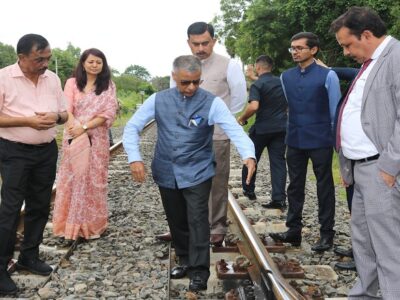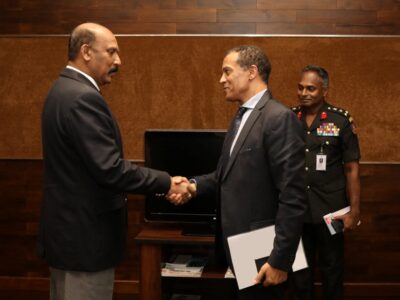(COLOMBO, LANKAPUVATH) – Sri Lanka’s Plantation Industries Minister Navin Dissanayake says an effective weedicide is promptly needed to prevent further damage to the tea industry affected by the glyphosate ban as human labor to control growing weeds in tea plantations is costly.
The Minister expressed his views on the glyphosate ban addressing the media after a workshop on the best agricultural plans for the Tea Industry held for top officials of the plantation companies to improve the quality of the regional plantation companies.
Minister Dissanayake said various statements have been made about the glyphosate ban and he is neither scared of challenges made by various groups against lifting the ban nor presenting any challenges.
However, the Minister remarking that he prefers to use the word ‘weedicide’ instead of glyphosate, said a weedicide is essential for the commercial agriculture.
“A weedicide is not needed for home gardening but for companies that grow crops in thousands of hectares of land need a weedicide, especially since a high price have to be paid for human labor. So they need weedicide,” the Minister said.
He further explained that the World Health Organization has labeled glyphosate as a carcinogen but meat, especially beef is said to have carcinogens as well.
“Other countries, our neighbor India, Japan and New Zeeland specially, very eco-friendly countries, have not banned glyphosate and they still use it for the crops,” the Minister pointed out.
He said the National Economic Council appointed by the President has taken a decision to lift the ban on glyphosate at least for the tea plantations.
“It was not my decision to lift the ban, President’s National Economic Council decided to remove the ban and I will follow accordingly,” he said.
Referring to the objection of Ven Athuraliye Rathana Thera to lifting the ban on glyphosate, the Minister said the Thera has the right to object and they also have the right to express their views on the detriments of the ban.
The Minister pointed out that the glyphosate ban has caused significant damage to plantation companies, planters and agricultural economy and the losses to the country have been estimated to be about 15 to 20 billion rupees.
“I will no object (to the ban) if there is clear evidence of harm to humans. Especially, there was no proven connection of flyphosete to the kidney disease. If there is proof I would not speak about lifting the ban,” he said.
The President, who was the Health Minister of the former government, banned the imports of Glyphosate, which he said is linked to the kidney disease. However there are no scientific proof about a link between the kidney disease and glyphosate manufactured by Monsanto although a role of nephrotoxic agrochemicals cannot be conclusively discarded
Minister Dissanayake further said that he will not be influenced by large companies but a weedicide is needed to remedy the problem of controlling weed in the plantations. “Since a weedicide is essential to revive the declining tea industry, we request the Athuraliye Rathana Thera to provide us a suitable weedicide if not glyphosate,” the Minister said.
A cabinet-appointed committee last year has recommended that the plantations industry should be allowed to import the weed killer under carefully controlled and supervised conditions




